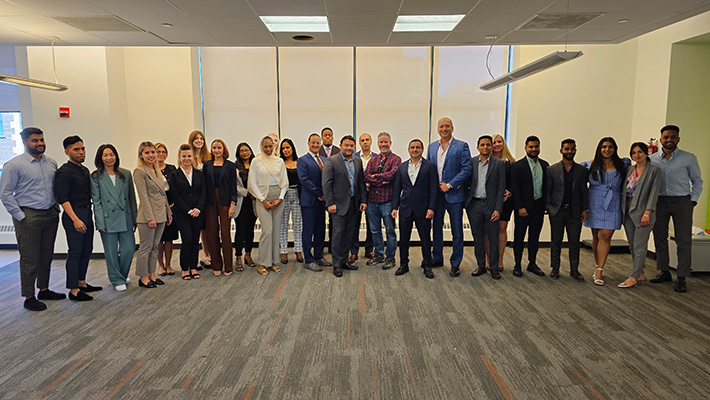Experts: How GFE Went Big
September 6, 2023The Brewster Building is an icon in Long Island City, a bustling district of Queens that’s right across the water from Manhattan. Most people know the building as the official headquarters of JetBlue because their giant logo on the roof can be seen from miles away. Others identify it as a major corporate hub for The Estée Lauder Companies since they sublease a substantial amount of office space inside. But up on the eighth floor, men and women traversing the hallways in suits work for another employer that’s making a splash in a different industry altogether. The sign on their door says GFE, which is short for Global Funding Experts. It’s a company that provides working capital to small businesses nationwide and they just recently secured a senior debt facility of up to $100 million.
Boris Musheyev, GFE’s CEO, founded the company almost a decade ago with partner Viacheslav “Steve” Eliyayev. Musheyev was working mainly in real estate when he learned about an innovative way to support small businesses by purchasing their future receivables. A cautious investor, he didn’t just jump right in. Instead, he bided his time with research on how it worked. He crunched numbers and analyzed the risks before he was confident it was something he wanted to do.
“From the outset, I’ve only channeled funds into ventures I wholeheartedly believed would both succeed and offer genuine value,” Musheyev told deBanked. “This commitment was evident in 2013 when we began by investing our capital.”
Alas, Global Funding Experts was born. The company’s model is referral partner driven, meaning they rely on ISOs for submissions and there’s no internal sales force. Today, GFE has an estimated 1,500 ISOs signed up and they receive about 700 applications on an average day. It’s a level of scale that wouldn’t be possible if they didn’t have an efficient CRM, something Musheyev predicted the necessity and utility of long before. GFE began building its own proprietary CRM in 2017 and the company used that to accelerate growth beyond its early startup days.
 With its momentum, GFE brought on Boris Shakhmurov to serve as COO in 2019, a traditional banking executive with 20 years experience. Shakhmurov was previously an Executive Director at JPMorgan Chase and had overseen mainly cybersecurity, technology controls, and compliance before making his move to GFE. The two Boris’s knew each other previously, having been friends for over 30 years already. At GFE, Shakhmurov’s pitch that “banks don’t lend to small businesses” lands differently given his background.
With its momentum, GFE brought on Boris Shakhmurov to serve as COO in 2019, a traditional banking executive with 20 years experience. Shakhmurov was previously an Executive Director at JPMorgan Chase and had overseen mainly cybersecurity, technology controls, and compliance before making his move to GFE. The two Boris’s knew each other previously, having been friends for over 30 years already. At GFE, Shakhmurov’s pitch that “banks don’t lend to small businesses” lands differently given his background.
“As an expert in Governance, Risk, and Compliance, when I joined the organization in 2019, our goal was to establish a best-in-class MCA Operational Resilience framework to address current and future challenges facing our industry,” Shakhmurov said. “With a focus on building strong and resilient operational controls, we used a multidisciplinary approach to assess the risk across all of our information assets and business processes. The Zero Trust and Defense-in-Depth approach enabled us to focus on early detection, rapid response, enhanced protection, and reducing single points of failure throughout the entire MCA lifecycle.”
For all the technical talk, Shakhmurov said what really stands out is the firm’s family-like atmosphere, which one can see for themselves in their spacious office. That environment has been achieved all while tightly controlling and compartmentalizing access to data, the company says. Security is paramount.

With the infrastructure in place, GFE hired Jonathan Mayer to be their CFO, a veteran accountant who previously spent more than 10 years at Grant Thornton LLP. Mayer first met Musheyev and Shakhmurov in 2021 and he echoed a similar sentiment about how he ended up at GFE. “The work ethic and trust and family environment really stood out to me,” Mayer said.
Between Musheyev, Eliyayev, Shakhmurov, and Mayer, the firm was then off to the races, ultimately leading up to the securing of a debt facility last month of up to $100 million. A lot went into making that happen, including the enlistment of a well known industry law firm to perform the due diligence, they say.
“Through consistent communication with our merchants and operational adaptability, we’ve not only met but surpassed our profitability benchmarks, all the while ensuring minimal defaults in our portfolio,” Musheyev said.
The company also credits having a qualified CFO and robust CRM technology as being necessary ingredients to getting a serious deal done. GFE’s signature products include purchases of future receivables, reverse consolidations, and more recently something called “Incremental Funding.” There’s also no commission clawbacks, they tout. Overall, GFE has funded over $400 million in capital to small businesses since inception.
The executive team heaped praise on the staff for being integral to their success.
“What we have is trust,” Shakhmurov said, who comes back again and again to the importance of building a business that will endure. “If you look at the banking industry, you need operational resilience,” he said.
New York’s Fourth Department: Revenue Purchase Agreements Are Not Loans
August 25, 2023A lawsuit brought by Samson MCA LLC against Joseph A. Russo M.D. P.C./IV Therapeutics PLLC, DBA Aspire Med Spa & Joseph Russo & Marco V Beatrice has brought revenue purchase agreements back in to the legal spotlight in New York State. Once again its been affirmed that they’re not loans.
In May 2021, plaintiff Samson MCA sued defendants for breach of contract and won on summary judgment despite defendants’ contentions that the revenue purchase agreements at issue were actually “criminally usurious loans.” Defendant Marco V Beatrice appealed. After a very careful analysis of the agreements, a final decision was issued by the Appellate Division, Fourth Department on August 11, 2023.
“On appeal, [defendant] contends that the agreements are void because they are criminally usurious loans and that the court therefore erred in granting plaintiff’s motion and denying defendants’ cross-motion with respect to him,” the Court stated. “Thus, the central question before us is whether the two agreements were, in fact, revenue purchase agreements or whether they were, instead, loans.”
The Court said that when determining whether a transaction constitutes a loan, courts must determine whether the amount is repayable absolutely or under all circumstances:
“Usually, courts weigh three factors when determining whether repayment is absolute or contingent:
(1) whether there is a reconciliation provision in the agreement;
(2) whether the agreement has a finite term; and
(3) whether there is any recourse should the merchant declare bankruptcy”
Final decision:
Contrary to [defendant’s] contention, plaintiff established as a matter of law that the agreements were revenue purchase agreements rather than loans, and [defendant] failed to raise a triable issue of fact with respect thereto (see Principis Capital, LLC, 201 AD3d at 754). Here, the agreements submitted by plaintiff contained reconciliation provisions requiring the adjustment of the remittance amount upon request based on changes to the entity defendants’ revenues, and had no finite term and no payment schedule. Additionally, as noted, each agreement contained an acknowledgment “that [plaintiff] may never receive the purchased amount in the event that [the entity defendants’ business] does not generate sufficient revenue” and, for the most part, plaintiff did not have recourse in the event that the entity defendants declared bankruptcy (see Streamlined Consultants, Inc. v EBF Holdings LLC, 2022 WL 4368114, *5 [SD NY, Sept. 20, 2022, No. 21-CV-9528 (KMK)]).
We have reviewed [defendant’s] remaining contention and conclude that it does not warrant reversal or modification of the judgment.
The original lawsuit can be found under Index No. 129401/2021 in the New York Supreme Court.
Full decision by the Appellate Division, Fourth Judicial Department can be found here.
Should Lightspeed Ramp Up its Merchant Cash Advance Business?
August 18, 2023 Analysts are wondering if Lightspeed should be doing even more merchant cash advances than the company’s currently doing. The company generated just $8.1M in revenue from them over the last fiscal year, a number that amounted to just 1% of total revenue.
Analysts are wondering if Lightspeed should be doing even more merchant cash advances than the company’s currently doing. The company generated just $8.1M in revenue from them over the last fiscal year, a number that amounted to just 1% of total revenue.
“Under normal circumstances, we would likely be pushing [Lightspeed] Capital even harder,” said Lightspeed CFO Asha Bakshani during the Q1 2024 FY earnings call this month, “however, given the current macro environment, we’re being conservative on the ramp. There’s no lack of demand from our customers, and we believe our high GTV customer base is an ideal demographic to use this financial service, especially in the long term. Risk of business failure is much lower with high GTV customers, but the need for capital is still substantial.”
When Lightspeed touted that it had increased its total merchant cash advance receivable balance by $11M for the quarter, an analyst from Bank of America Merrill Lynch wondered if they were being too conservative. “You mentioned that you would be pushing harder, but given the macro, you’re being conservative on the ramp,” the analyst said, “But then, you also mentioned that there is demand for it, so if there is demand, why not push a little bit harder for capital?”
“Yeah, you’re absolutely right,” Bakshani replied. “Capital is a very promising business for us, but what we have to keep in mind is that it still represents today a low single-digit millions in terms of revenue. And so when our sales teams are fully focused on unified payments, there was some distraction in the quarter on capital. And in addition, we want to make sure that in today’s macro that we’re not rushing anything. We want to make sure that we ensure that we stick with the very high rated credit-rated customers for eligibility. But you’re absolutely right, there’s tons of demand. We’re just taking our time intentionally given the macro. Our default rates still remain extremely low, but we definitely should see that pick back up in the back half of the year when unified payments is behind us.”
Lightspeed’s merchant cash advance program was repeatedly raised during the call in very positive terms.
“Once you’re on Lightspeed payments, we underwrite you for capital so you can have access to capital,” said Jean Paul Chauvet, CEO of Lightspeed. “That is a big win for them and our customers.”
Success On the Last Day? It’s Really About What Happens All Month
August 7, 2023 There isn’t a more chaotic time in this industry than the last day of the month. Brokers on the front line scramble to close deals to hit their sales targets while funders provide vital support from the backend.
There isn’t a more chaotic time in this industry than the last day of the month. Brokers on the front line scramble to close deals to hit their sales targets while funders provide vital support from the backend.
Paul Boxer, COO of Merchant Marketplace calls the last working day “the most insane day of the month.” Boxer told deBanked “… for us we know that on the funding side to make our investors and syndicators happy it’s a very crucial integral day that we’re all hands on deck to do whatever we can to make sure as many deals get funded as possible.”
Among the secrets to a successful end-of-month performance, however, is operating efficiently throughout the month, several sources opined. For Moe Braun, the Senior Director of Business Development at Rocket Capital, he said that means communicating with ISOs about what deals they’d really want to see get closed and funded so that their ISOs are spending their time pursuing the right files all along. Braun himself even sets his own daily and weekly goals to maximize efficiency.
“I think the easiest way to avoid the pressures are to kind of granulate those quotas, instead of monthly, as granular as you can get,” said Braun, “So weekly, daily; when I come into the office every day, I know what I want to get done that day. And then if I get it done that day, I try to focus on how I did and copy that for the next day. And same goes for my week, I look at the end of the week on Fridays, I say ‘hey, was this a good week? Was this a bad week? What went well, how can I do that again next week? And what went wrong and how can I correct that for next week?’”
For Russell Kimyagarov, the Founder and CEO of Fratello Capital, he says they’re constantly tuned into their CRM, tracking deals that receive pre-approvals and identifying follow-ups needed.
“We also have meetings once a week with the staff, with the team, to make sure if there’s anything that we could do better that we’re discussing it and implementing it to close more files and stay in touch with the ISOs a little better,” Kimyagarov said.
“In our CRM, we do track how many submissions a day from which broker,” said Boxer of Merchant Marketplace. “How many offers? Then the breakdown between submissions to offers to contracts out. Why it did or didn’t fund. To the ones that didn’t fund, what happened? Did they get funded somewhere else? Did the merchant just start ghosting the broker? Did it die for other reasons?”
Even for Boxer who knows what the last day of a month is like, he affirmed that there is a bigger picture to it all.
“I think that in this business there are other ways to focus your business, a lot of it’s based on like mentioning quotas and numbers, for us it’s really about relationships,” Boxer said.
Lightspeed Capital Generated $8.1M in MCA Revenue Last Year
June 23, 2023 When Lightspeed announced it was expanding its MCA program to the United Kingdom, Australia, New Zealand and Quebec, one may have been wondering who they were. The POS e-commerce platform has actually been around since 2005 and has been slowly building up its MCA offerings. Indeed, last quarter deBanked pointed out that the company had been increasing its volume.
When Lightspeed announced it was expanding its MCA program to the United Kingdom, Australia, New Zealand and Quebec, one may have been wondering who they were. The POS e-commerce platform has actually been around since 2005 and has been slowly building up its MCA offerings. Indeed, last quarter deBanked pointed out that the company had been increasing its volume.
As of the company’s fiscal year-end of March 31, 2023, the company had an MCA receivable balance of $29.5M, up from $6.3M YoY. Altogether, Lightspeed generated $8.1M in revenue in FY 2022, amounting to only about 1% of its overall revenue. That means there’s still a lot more room for growth.
“We believe real-time access to capital is one of the largest challenges facing merchants today,” said JP Chauvet, Lightspeed CEO in a press release. “This expansion of Lightspeed Capital provides a simple, streamlined opportunity for our merchants to invest in their business. Our goal is to help turbocharge their operations … all through a single, integrated commerce solution.
Federal Legislators Jump on Commercial Financing Disclosure Bandwagon, Renew Push to Give CFPB Authority Over Industry
June 16, 2023 Feel like there’s a lot of state-level disclosure going around lately? Well now some members of Congress believe another layer is needed at the federal level. In a bill titled the “Small Business Financing Disclosure Act of 2023,” the language looks awfully familiar. There’s a Double Dipping clause in it, for example, which was a term first seen in a New York State law.
Feel like there’s a lot of state-level disclosure going around lately? Well now some members of Congress believe another layer is needed at the federal level. In a bill titled the “Small Business Financing Disclosure Act of 2023,” the language looks awfully familiar. There’s a Double Dipping clause in it, for example, which was a term first seen in a New York State law.
The federal bill, which was introduced by US Senator Robert Menendez and Congresswoman Nydia M. Velázquez, seeks to place the small business finance industry under the authority of the Consumer Financial Protection Bureau (CFPB). As part of that, the Director (currently Rohit Chopra) would be responsible for devising all the rules and formulas, according to the bill. Furthermore, with regards to sales-based financing, the bill specifically states:
1. The provider must disclose an APR.
2. The estimated term of repayment and periodic payments based on projected sales volume must be disclosed.
“Small businesses are the lifeblood of the American economy,” said Congresswoman Velázquez. “But for too long, predatory lenders have taken advantage of businesses in need of capital by offering loans and similar products with unclear terms and exorbitant interest rates.”
Supporters of the bill, including Senator Sherrod Brown and Senator Ron Wyden, also stated that the bill is aimed at “predatory lenders.”
In Senator Menendez’s press statement for the bill, it cites Funding Circle, a small business lending company, as a supporter.
“We believe a free and fair market operates most efficiently when there is transparency in pricing, terms and conditions,” said Ryan Metcalf, Head of U.S. Public Affairs at Funding Circle U.S. When a small business has all of the necessary information up front including the annual percentage rate (APR), they can comparison shop and make informed decisions that are best for their business. Funding Circle supports one national uniform small business financing disclosure law because it is in the best interests of small businesses and interstate commerce.”
The push for a small business financing bill is not new. A similar bill introduced by Velázquez last year did not move forward, nor did the one from 2021, nor the one from 2019. The difference is that previous versions focused on Confessions of Judgment and fairness in small business lending. The latest version takes on the air of disclosure while attempting to subjugate the whole industry to CFPB regulatory authority.
When Your Competitors Do Wrong, Do Right
June 1, 2023 “…no matter what industry you’re in there’s always going to be bad apples, and you kind of have to see which way they’re coming from,” said Heather Francis, CEO at Elevate Funding.
“…no matter what industry you’re in there’s always going to be bad apples, and you kind of have to see which way they’re coming from,” said Heather Francis, CEO at Elevate Funding.
Competition within this industry will always exist, fueling the drive of professionals in the field. But how can one compete with a competitor who is actively deceiving the merchant? Furthermore, how can one advise that client to exercise due diligence without appearing to display dishonest intentions? Transparency has become a rising issue separating those in the field for the right reasons from those who are not.
“Companies should be dedicated to conducting their business consistent with the highest standards of ethics and integrity,” said Laura M. Marolla, VP ISO Relations at World Business Lenders (WBL). “We have an obligation to our colleagues, customers, business partners and investors, as well as the communities in which we operate to be honest and forthright in all our business practices and interactions.”
Funding and lending companies working with customers should be forthright about everything, from the amount the customer will receive, the total cost, and what they should expect throughout the relationship. Also they should be consistent with the terminology used so that the customer doesn’t become confused.
Francis explained that terms like “fee” could be interpreted in several different ways. Her company has developed an entire blog dedicated to terminology to help merchants weed out jargon.
“Terminology is very very important because I could understand fee to mean one thing and you could understand it to be different,” said Francis. “And that’s not transparent if we’re speaking a different language, that can be misconstrued.”
Case in point, Francis’s company Elevate offers Revenue-based financing while Marolla at WBL offers loans. On this basis alone, each company’s product works very differently.
“Ongoing education for all staff should be required, during which responsible lending practices should be emphasized and ingrained into the culture of the organization,” said Marolla. “While in the end, each merchant must take responsibility for its business decisions, informed decisions by merchants can be facilitated through transparency in disclosures and responsible business practices throughout the lending process.”
And if a competitor is not being transparent or responsible, Francis said that there is a delicate way to communicate that to the customer.
“From our team, what we do if a merchant says, ‘hey, so and so promised me X, Y, and Z,’ if there are reviews out there that show the other company can’t deliver that, we will send them the link. ‘You can see what previous customers have said, and it seems like they haven’t always been true to their word.’ We can also give the client something to look out for.”
One particular thing she said can be a red flag is if a company tells the customer at the last minute that they’re going to get a lot less than what they originally contracted for, which they have seen happen. Elevate hopes that when a customer recognizes a warning sign that they will remember Elevate’s polite manner of advising them what to have looked out for in the first place.
Francis explained it’s about making them feel free to come back to them, that there’s no hard feelings if it looks like they got a better deal. “‘If you have any questions. If you don’t feel that the person is being truthful with you, we’re happy to answer any questions, or you can bounce ideas off of us,'” is the message they try to leave them with. “We’re just trying to have a relationship so that we can curtail someone who’s lying about what they’re doing.”
Revenue-Based Financing? This Team of Entrepreneurs Learned The Trade in Argentina
May 26, 2023 Javier Alvarez Wrobel and Juan Cruz Alvarez Wrobel, brothers from Argentina, have worked in the lending business together for years. They’re even co-founders of a company that’s based in Buenos Aires.
Javier Alvarez Wrobel and Juan Cruz Alvarez Wrobel, brothers from Argentina, have worked in the lending business together for years. They’re even co-founders of a company that’s based in Buenos Aires.
It’s taught them a lot. While Americans fret over single digit inflation, Argentina’s rate of inflation soared past 100% earlier this year, the highest rate since it began dramatically increasing in 2018. That makes it very challenging to lend in the country.
“Due to the recent complicated economic situation, lots of lending companies in Argentina have closed,” said Javier. “I’d say there are only around 30 to 40 companies in the country doing what we do right now.”
For a population that largely also has little or no credit history, credit reports generally can’t be relied upon to approve loans at scale.
“That is why a lot of the underwriting in Argentina, when people request a loan, is made based on the cash movements on the consumers bank accounts,” said Javier.
That’s what they learned how to do. And with such a skillset as theirs, they were intrigued to learn that a similar model had taken off in the United States, one where business owners can get approved for funding based on data mostly available in their bank statements, revenue-based financing. The result was an expansion to the US and their launch of Upfunding Capital in Miami, FL in 2022. There, they teamed up with a third co-founder named Paula Sborovsky, who previously worked in Entre Ríos, a province directly north of Buenos Aires that sits along the border of Uruguay.
In the process, they’ve established a niche, a clientele mostly made up of immigrant business owners that have an Individual Tax Identification Number (ITIN) but not a social security number. The thin credit or lack of credit that may come with that is something they’re already used to.
“As we work with the Latino community, most of our clients are actually non-US citizens or at least not US born,” Javier said.
Javier said that the best and most reliable information they use for approvals is the way business owners conduct transactions on a day-to-day basis. Nevertheless, the company is pacing itself, testing out its technology and its underwriting models. Upfunding hopes to ramp up its volume in the second half of this year.
The work so far has been personally rewarding for the Upfunding team.
“It’s amazing to see,” said Javier, “for example, I got the chance to speak to a guy that is actually Argentinian living [in the US], trying to sell shoes, and seeing that we can actually offer a product for them to improve their own business that’s just starting out, for us is amazing because we are actually doing the same right now.”































